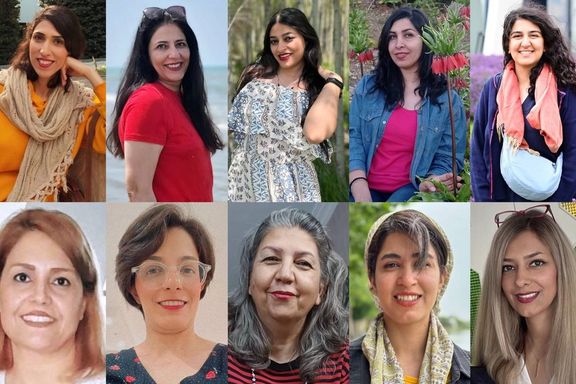Ten Baha'i women in Iran sentenced to a total of 90 years in prison

As Iran’s crackdown on the Baha’i minority continues at full force, 10 women have been given a total of 90 years in prison plus punishments including fines and travel bans.

As Iran’s crackdown on the Baha’i minority continues at full force, 10 women have been given a total of 90 years in prison plus punishments including fines and travel bans.
Charged in the Isfahan Revolutionary Court with "educational and propaganda activities against the sacred Islamic law”, a source familiar with the case told Iran International that the court classified the verdict as "confidential and security-related”.
Lawyers have been prevented from photographing or receiving a copy of the judgment, delivered to the legal team in person on Sunday.
The women have had all phones, laptops, digital devices, gold items, necklaces, rings, and US and Australian dollars confiscated from their homes as a "supplementary punishment" for the benefit of the "Muslims' Fund (the state).”
They are also on travel bans and social media bans for two years in addition to being levied $15,000 in fines.
According to information obtained by Iran International, the court cited activities such as organizing educational classes on music, yoga, painting, English language, and nature tours for Iranian and Afghan children and teenagers as evidence of the charges.
Among the women charged are Yeganeh Rouhbakhsh and Arezou Sobhaniyan, a mother and daughter, Rouhbakhsh just 19 years old.
The women were arrested in October 2023, and one month later, Iran International reported that Ministry of Intelligence agents had threatened their friends, neighbors, and non-Baha'i classmates, warning them that if they did not file complaints against the group or claim they were being coerced by them, they would face legal consequences.
A source close to the families told Iran International that the threats included dismissal from their jobs or expulsion of their children from schools and universities. In some cases, the authorities warned, "We will use any political content or evidence found on your phones to build a case against you."
Baha'is are the largest non-Muslim religious minority in Iran and have faced systematic persecution since the 1979 Islamic Revolution and in recent months it has intensified.
Last month, the Baha'i International Community issued a statement noting that despite promises by President Masoud Pezeshkian’s administration to respect the rights of all ethnic and religious minorities, Baha'is in Iran continue to face persecution.
Unofficial sources estimate that over 300,000 Baha'is live in Iran. The Constitution of the Islamic Republic officially recognizes only Islam, Christianity, Judaism, and Zoroastrianism.
Since the 2022 Women, Life, Freedom uprising which has seen woman in Iran under even greater threat of arrest than ever before, the risks for Baha'i women have soared, with dozens summoned to court facing vague criminal charges.
Since early March, over 75% of the Baha'is summoned to court or prison — 65 out of 85— have been women, according to the Baha’i International Community.
Currently, two-thirds of all Baha'i prisoners in Iran are women, many detained without due process, with some detainees' whereabouts still unknown.
In April, Human Rights Watch released a 49-page report, “‘The Boot on My Neck’: Iranian Authorities’ Crime of Persecution Against Baha’is in Iran,” documenting Iranian authorities’ systematic violation of the fundamental rights of members of the Baha’i community.
Human Rights Watch found that Baha’is face "a spectrum of abuses". "Government agencies arrest and imprison Baha’is arbitrarily, confiscate their property, restrict their education and employment opportunities, and even deny them dignified burial," a statement said.
Michael Page, deputy Middle East director at Human Rights Watch added: “Iranian authorities deprive Baha’is of their fundamental rights in every aspect of their lives, not due to their actions, but simply for belonging to a faith group. It is critically important to increase international pressure on Iran to end this crime against humanity.”